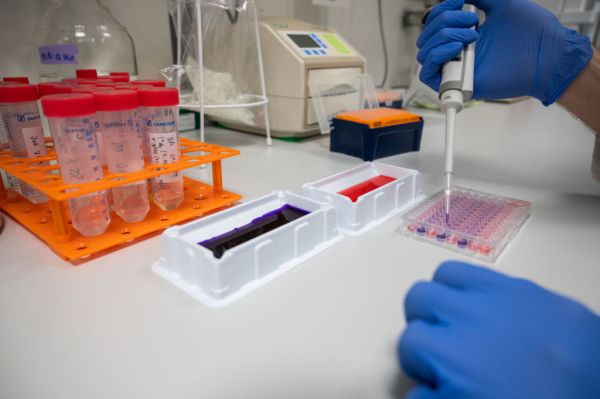Happy Monday! Do you like this newsletter? Do you want to help write this newsletter?
We’re looking to hire a reporter to work with Declan and Esther on putting The Morning Dispatch together every day. If you have one to two years of journalism experience and think you might be a good fit, we hope you’ll consider applying! More information about the job can be found here.
Quick Hits: Today’s Top Stories
- Attorney General Merrick Garland announced Friday he is appointing Jack Smith to serve as a special counsel overseeing two federal criminal investigations implicating former President Donald Trump, regarding potential interference in the transfer of power and the potential mishandling of classified documents and other presidential records. Garland said he decided such a move was “in the public interest” after Trump’s 2024 campaign launch, given he could theoretically be running against President Joe Biden. White House press secretary Karine Jean-Pierre told reporters Biden was not aware of Garland’s decision prior to the announcement. Smith—a longtime prosecutor most recently charged with investigating and adjudicating war crimes in Kosovo for the special court in The Hague—said he will exercise independent judgment “and will move the investigations forward expeditiously and thoroughly to whatever outcome the facts and the law dictate.” Trump criticized the move on Friday as “unfair,” “political,” “not even believable,” and “the worst politicization of justice in our country.”
- Five people were killed and 25 more injured in a mass shooting at a gay nightclub in Colorado Springs on Saturday night. The alleged gunman—a 22-year-old man who was reportedly arrested last year for making a bomb threat—was subdued by club patrons and arrested and is being treated for injuries. Colorado Springs Mayor John Suthers said yesterday the shooting has “all the appearances of being a hate crime.”
- In a court filing on Thursday, the Biden administration argued that Saudi Crown Prince Mohammed bin Salman, as a sitting head of state, has immunity in a civil lawsuit brought by Hatice Cengiz, the former fiancée of Jamal Khashoggi, the Saudi journalist whose 2018 murder was carried out by Saudi government agents and—according to the CIA—ordered by bin Salman himself. The decision was slammed by Cengiz, the Washington Post, and a number of human rights organizations, but the State Department said the move was “purely a legal determination” based on “longstanding and well-established principles” and does not “reflect an assessment on the merits of the case.” GOP Sen. Tom Cotton agreed, telling Fox News on Sunday it would have been a “major breach with customary practice and international law” had the Biden administration not weighed in.
- The Turkish Defense Ministry announced Sunday it had launched a series of airstrikes on Sunday targeting Kurdish militants in northern Syria and Iraq, whom the Turkish government blames for a bombing in Istanbul last week that killed six people and wounded dozens others. The Kurdish groups have denied responsibility for the attack, but the Turkish military said it hit 89 separate targets associated with the militants, including “shelters, bunkers, caves, tunnels and warehouses.”
- Days after a stray missile killed two people in a Polish village near the Ukrainian border, German Defense Minister Christine Lambrecht said Germany is offering Poland some of its Patriot missile defense systems. Lambrecht also said Germany will extend an existing deployment of Patriot systems in Slovakia through 2023 and “maybe even longer.”
- Although the race is likely headed to an automatic recount, Adam Frisch—the Democratic candidate for Colorado’s 3rd congressional district—conceded to Republican Rep. Lauren Boebert on Friday to avoid furthering “a narrative that the recount could alter the fact that we came up 554 votes short.” Republicans have now won—or are leading in—222 congressional districts, compared to Democrats’ 213.
- With Reps. Nancy Pelosi and Steny Hoyer stepping down from their leadership posts, Reps. Hakeem Jeffries of New York, Katherine Clark of Massachusetts, Pete Aguilar of California, and Jim Clyburn of South Carolina formally launched their bids over the weekend for House Democratic leader, whip, caucus chair, and assistant leader, respectively. Aguilar could be challenged by Rep. Joe Neguse of Colorado, but the other three are expected to face minimal opposition. The party’s leadership elections are set to take place on November 30.
- The National Association of Realtors reported Friday the median existing-home sales price in the U.S. was $379,100 in October—down from a record $416,000 in June, but up 6.6 percent from October 2021—while sales of previously owned homes declined for the ninth straight month, down 28.4 percent year-over-year.
- The Walt Disney Company announced Sunday night its board of directors had reappointed Robert Iger chief executive officer—a role he previously held for 15 years before leaving the company at the end of 2021—because he is “uniquely situated” to lead Disney through an “increasingly complex period of industry transformation.” The moves come just weeks after Disney reported weaker-than-expected fourth quarter earnings. Iger will replace Bob Chapek, who succeeded him as CEO in 2020.
- After being found guilty on four charges of fraud in January, Elizabeth Holmes—founder of the supposed blood-testing startup, Theranos—was sentenced on Friday to more than 11 years in prison.
- President Biden turned 80 years old on Sunday, becoming the first octogenarian to hold the presidency.
RSV Surges Among Infants

By the time the average toddler is spitting all over his second birthday cake in an effort to blow out the candles, he’s likely already had a bout of respiratory syncytial virus (RSV).
Most children recover on their own in a week or two, but because so many catch RSV, even the small fraction of more severe cases adds up to a lot of sick babies. According to the CDC, RSV hospitalizes between 58,000 to 80,000 kids under five in the United States in an average year—and kills 100 to 300.
But this year is not an average year: Babies six months old and younger are getting hospitalized with RSV at nearly seven times the pre-pandemic rate, per CDC surveillance data. Combined with a flu surge, the high case counts are overwhelming hospitals. “These unprecedented levels of RSV happening with growing flu rates, ongoing high numbers of children in mental health crisis and serious workforce shortages are combining to stretch pediatric care capacity at the hospital and community level to the breaking point,” the Children’s Hospital Association and the American Academy of Pediatrics wrote last week in a letter to President Biden and HHS Secretary Xavier Becerra. “The pediatric health care system is doing all it can to meet these overwhelming needs across the continuum of care and taking regional approaches to meet the growing demands.”
RSV produces typical cold symptoms—congestion, fever, coughing—and is particularly dangerous to infants, because their small airways are more prone to inflammation and easier to block with mucus, making it difficult for them to nurse or bottle feed. Immunocompromised people, those with neuromuscular disorders that make swallowing or coughing difficult, and the elderly are also at higher risk. An average of 60,000 to 120,000 older adults are hospitalized with RSV each year, and 6,000 to 10,000 die, according to the CDC.
Researchers aren’t entirely sure what’s causing this year’s early surge in hospitalizations, but suspect lifted COVID-19 precautions have something to do with it. Pandemic safety measures suppressed the spread of RSV, leading to rock-bottom case counts in 2020. Now the virus is making up for lost time, reaching children who didn’t catch it in the last couple of years. “We are also seeing two or three-year-olds that actually have fairly severe RSV because they weren’t exposed to it when they were younger,” Dr. Tina Tan—vice president of the Infectious Diseases Society of America and a pediatrics professor at Northwestern University’s Feinberg School of Medicine—told The Dispatch. “Pediatric hospitals especially are completely overwhelmed.” Flu cases have also shot up in recent weeks, with hospitalization numbers blowing past previous years’ November rates.
The RSV and flu surge is hitting an already-depleted pediatric care system. In addition to general pandemic-era burnout and turnover among pediatricians, many hospitals converted pediatric capacity into COVID wards for adults. Realizing higher profit margins caring for adults, many pediatric units never reopened. “That really puts a burden on the hospitals that do have pediatric units,” Tan said.
The combination of an early surge and reduced capacity has left pediatric hospitals hitting max capacity sooner than in past years’ RSV and flu seasons. Nationwide, about 80 percent of pediatric hospital beds were full last week, according to an NBC analysis of data from the Department of Health and Human Service, and Washington, D.C., and Arizona were near max-capacity. At Rhode Island’s only children’s hospital—where all the beds were full last Monday while more families waited for care—medical director Dr. Frank Overly said he’d helped clean beds and usher patients from the waiting room to free up other staff for patient care. Patients waiting for beds linger in emergency rooms, delaying care for others.
Last week’s letter from the Children’s Hospital Association and the American Academy of Pediatrics asked Biden and Becerra to declare emergencies that would release unleash extra funding and federal response teams. “We need emergency funding support and flexibilities along the same lines of what was provided to respond to COVID surges,” the letter read. With extra help from emergency declarations, hospitals could increase capacity by setting up auxiliary tents and hiring more staff, Tan said. But Dawn O’Connell, HHS assistant secretary for preparedness and response, said earlier this month that states so far haven’t asked for help from federal health teams and stockpiled medical supplies. The Biden administration has said it’s helping on a case-by-case basis and that an emergency declaration will depend on “nationwide data, science trends, and the insight of public health experts,” NBC reported.
For now, there’s no RSV-specific antiviral treatment or vaccine—but that could soon change. Pfizer announced earlier this month that, in a clinical trial, its RSV vaccine was 69 percent effective at preventing severe cases in babies under six months old. The shot is administered to women during pregnancy so that newborns have antibodies. Pfizer will seek Food and Drug Administration and CDC approval for the shot and—if approval is granted—the vaccine could be on the market as soon as next fall. Another vaccine targeted at people 60 years old and up is also under development.
Meanwhile, doctors are urging people gathering for Thanksgiving to be extra cautious not to carry RSV, the flu, or COVID-19 to infants and other at-risk people. That means taking typical safety precautions—hand-washing, wearing a mask or staying home with a cough or other cold symptoms—as well as getting vaccinated when possible. “Everyone should be up to date on their influenza vaccine and their COVID vaccines,” Tan said. “You don’t want to be bringing flu to the Thanksgiving dinner table.”
Worth Your Time
- As the FIFA World Cup kicks off in Qatar, don’t forget the thousands of migrant workers who reportedly died constructing the stadiums and infrastructure necessary to host the tournament. “[Shambhu] Chaudhary, a heavyset man with a thin mustache, heads to the back of his home to fetch a bag,” Tariq Panja and Bhadra Sharma report for the New York Times. “He reaches into it and pulls out a square bottle of orange and white capsules. They are part of a daily regimen he says is now required after having dizzy spells and collapsing while working under the desert sun. ‘It’s hot,’ he said, ‘but what are we going to do?’ Others, he knows, have suffered far worse. Sanju Jaiswal, 24, and her husband, Amrish, had high hopes about how his new job in Qatar would change their family’s fortunes. There was even talk about moving to Kathmandu, Nepal’s capital, so their three children could have a better education. A job as a motorbike courier offered a path to that life. But Amrish died within five months after arriving in Doha last October, run down by a car while making a food delivery.”
Presented Without Comment
Also Presented Without Comment
Also Also Presented Without Comment
Toeing the Company Line
- It’s the end of an era as House Speaker Nancy Pelosi sets down the gavel, and Friday’s Uphill (🔒) has all the details on what’s next for Democrats’ House leadership. Plus: a conversation with former House Speaker Paul Ryan about the challenges ahead for Republicans’ razor-thin House majority.
- Chris also reflects on Pelosi’s legacy in his latest Stirewaltisms (🔒), comparing her leadership style to that of Senate Minority Leader Mitch McConnell—and possible Speaker Kevin McCarthy. “Pelosi ruled with a combination of blunt force and a well-funded favor bank even after reversals,” he writes, “while McConnell maintains his position by a combination of deference to his fellow Republican members and fearsome political acumen.”
- Democrats love having billionaires in their corner to blunt charges of “Marxism.” Republicans have a soft spot for celebrities because seemingly every major movie star and musician is on the left. This covetousness, Jonah argues in Friday’s G-File, is how you get Sam Bankman-Fried and Donald Trump. “Coveting is different from mere desire or ambition,” he writes. “It’s an emotional state, much like lust and envy, that drives you to ignore good advice and your own conscience.”
- If House Republicans want to investigate the Afghanistan withdrawal, COVID-19’s origins, the Dobbs leak, border policy, and Justice Department politicization, why are they prioritizing their Hunter Biden probe? “The populist wing of the House GOP understands that partisan warfare, not policy, preoccupies the imagination of its fan base, so that’s what they play to,” Nick writes in his latest edition of Boiling Frogs (🔒). “There’ll always be time later to chitchat about how to control the border, but the urgent need to signal resolve in pursuing Hunter Biden and the ‘BIG GUY’ simply can’t wait.”
- On the latest episode of The Ruminant, Jonah riffs on Friday’s TMD before picking apart an article—written by the mother of Sam Bankman-Fried, the disgraced FTX ex-CEO—arguing we should abandon personal responsibility. Plus: why we must take bad ideas seriously, the future of the Federalist Society, and the necessity of hope.
- David has flipped, flopped, and flipped back again over the years when it comes to gay couples and civil marriage. In Sunday’s French Press, he walks readers through his journey and how it led him to support the Senate’s Respect for Marriage Act. “I want Americans of different faiths and no faith at all to be able to live together, work together, form families, and live with peace, security, and dignity,” he writes. “I don’t want my gay friends and neighbors to live in fear that the law might tear their families apart. I also don’t want the law to treat me as a threat.”
- On the site over the weekend, Guy Denton takes a trip on a cruise for Kiss fans, Peter Meilaender reviews George Saunders’ exploration of freedom and enslavement in Liberation Day, and Alec critiques a lackluster return to Wakanda in Black Panther: Wakanda Forever. Plus: Reuel Marc Gerecht examines the impact the end of Iran’s theocracy could have on the perception of America as the guardian of democracy.
- And on the site today, Price St. Clair examines the diverging political fortunes of North Carolina and Florida, while Chris Stirewalt diagnoses the GOP as being badly out of step with the electorate after three straight bad election cycles.
Let Us Know
Are you planning to watch the World Cup the next few weeks? Does the tournament’s location in Qatar—a country plagued by allegations of human rights abuses—have any bearing on your decision?








Please note that we at The Dispatch hold ourselves, our work, and our commenters to a higher standard than other places on the internet. We welcome comments that foster genuine debate or discussion—including comments critical of us or our work—but responses that include ad hominem attacks on fellow Dispatch members or are intended to stoke fear and anger may be moderated.